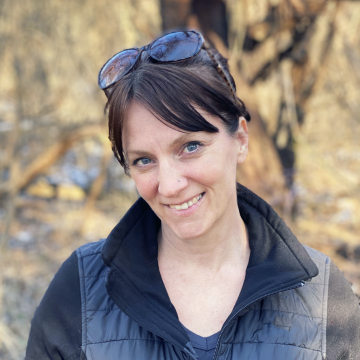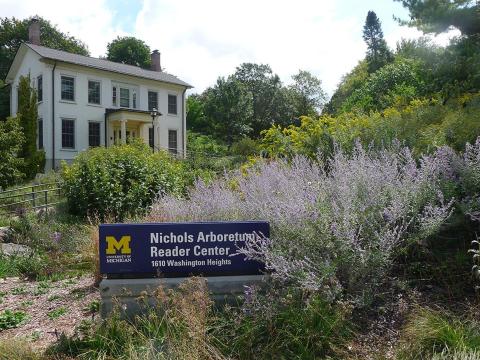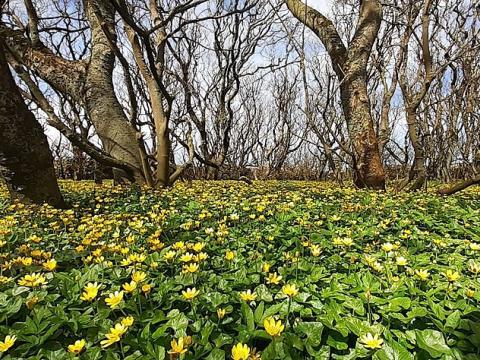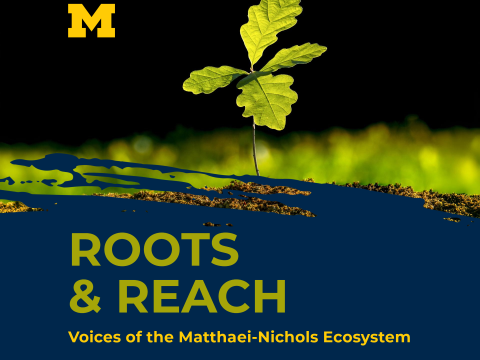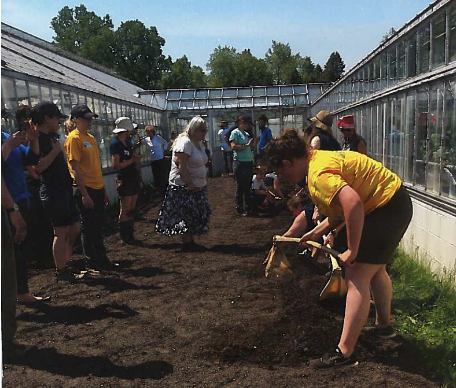
The University of Michigan, in collaboration with the College of Menominee Nation, is set to play a pivotal role in the newly announced National Science Foundation (NSF) Center for Braiding Indigenous Knowledges and Science (CBIKS): a five-year, $30 million international NSF Science and Technology Center based at the University of Massachusetts Amherst. The center will braid Indigenous knowledge systems with Western science to address some of the most pressing issues of our time.
CBIKS will work on complex, evolving challenges brought on by climate change, including dire impacts affecting land, water, plant, and animal life; the danger posed to irreplaceable archaeological sites, sacred places, and cultural heritage; and the challenges of changing food systems, all of which disproportionately affect Indigenous communities.
MBGNA Director Tony Kolenic shares, “Research and innovation – and arguably our democracy – are most productive when ways of knowing the world are actively in conversation with each other, growing new approaches and solutions to our shared challenges. Based on what Mi’kmaq peoples call ‘two-eyed seeing,’ the Center for Braided Indigenous Knowledges and Science does just that, and we couldn’t be prouder to serve alongside College of Menominee Nation to co-lead one of just eight global Hubs.”
CBIKS is structured according to Indigenous models of consensus decision-making and intergenerational learning and responsibility. The center’s team includes over 50 scientists — more than 30 of whom are world-leading Indigenous natural, environmental, and social scientists, representing Native American, First Nations, Métis, Native Hawaiian, Alaska Native, Māori, and Aboriginal Australian peoples. Among the 40 partner organizations are 29 universities, two tribal colleges, five NGOs, two national museums, and two industry partners. CBIKS unifies and propels community- and place-based initiatives and research. It does so in partnership with institutions and 57 Indigenous communities in eight international “hubs” in the U.S., Canada, Aotearoa New Zealand, and Australia. Over the coming years, CBIKS intends to grow these partnerships to include additional Indigenous community partners and more regional hubs.
Among the key CBIKS regional leaders is David Michener, Curator at Matthaei Botanical Gardens and Nichols Arboretum (MBGNA) and Mentor Faculty in the Public Engagement Faculty Fellowship contributing expertise in seed rematriation and Indigenous agricultural/plant sciences. Michener serves as one of the co-principal investigators and co-leads for the Midwest Hub, along with Jennifer Gauthier at the College of Menominee Nation. The Midwest Hub’s advisory group includes Kyle Whyte (UM-SEAS), who serves on the White House Environmental Justice Advisory Council and who contributes expertise in climate policy ethics, and Megan Bang (at Northwestern) who brings expertise in Indigenous land-based PreK-12 grade education.
In the initial year, David Michener, in close collaboration with the Michigan Anishinabek Cultural Preservation and Repatriation Alliance (MACPRA), a consortium representing the 12 Federally recognized and two State recognized Tribes in Michigan, along with the guidance of Elders, Knowledge Carriers, and Anishinabe language speakers, will embark on a targeted initiative aimed at advancing an Anishinabe research methodology. Michener and partners will then proceed to further refine this methodology by incorporating specific Anishinabe language concepts, which encapsulate essential information, metaphors, and vocabulary pertinent to research processes. This foundational work will serve as the cornerstone for the subsequent four years of research, fostering active engagement with Anishinabe communities across the Midwest Hub and the broader region. These efforts will significantly contribute to the Hub’s core functions, including the execution of projects to establish Research Foundations, the conduct of place-based studies, and the expansion of regional research networks.
“As the primary regional partner, our involvement is rooted in nearly twenty-five years of discreetly collaborating with Tribal institutions across Michigan, aligning our efforts with Tribal sovereignty and priorities. Continuous cultural guidance from the NAGPRA Office within the Office of the Vice President for Research has played a pivotal role in our work. This work would not be possible without the ongoing engagement of the Michigan Anishinabek Cultural and Repatriation Alliance (MACPRA) centered at the Ziibiwing Center for Anishinabe Culture & Lifeways.” says Michener.
“Our endeavors have been made possible through essential funding from two Graham Sustainability Institute Catalyst grants, as well as our recent success in the LSA Meet the Moment competition. Moreover, ongoing departmental support for thousands of miles of travel to facilitate in-person meetings throughout the Great Lakes region has helped us forge a robust network of relationships.” Among the few collaborative elements we’ve released to the public that involve UM student engagement are Roos’ Izhi-Minoging Mashkikiwan / Place Where Medicines Grow Well, Stoke and Goode’s Can Anishinabe-Centered Mnomen (Wild Rice) Restoration Help Restore Right Relations between the University of Michigan and Indigenous Communities, and Martin and Schneider’s YouTube overview of Rematriating Seed Relatives to the Communities of Origin.
The NSF Science and Technology Centers Integrative Partnerships program has supported research in areas of national importance since 1987. Science and Technology Centers (STCs) focus on establishing new scientific disciplines and developing transformative technologies that have the potential for broad impacts on science and society. The centers will shine light on emerging STEM fields to develop a globally competitive STEM infrastructure and conduct outreach to inform the public of breakthrough science.
In its pursuit of justice-centered work, CBIKS goes beyond research and embraces a crucial educational mission aimed at training postdoctoral researchers and graduate research assistants, with a focus on those from minority-serving institutions. Through initiatives like the Indigenous Science Scholarship Program and Study Abroad Program, the center opens doors for undergraduates and Indigenous community members to engage in research that intertwines Indigenous Knowledges and Western science. Moreover, it extends its commitment to education to K-12 students, offering them place-based learning experiences through Indigenous Science camps and after-school programs.
Beyond academics, the center also weaves art into its STEM research and dissemination endeavors. Notably, it fosters innovative initiatives such as the development of Indigenous Science Theater performances. These will feature Native artist groups led by the Anishinabe Theater Exchange. Indigenous Storywork and Knowledge Mobilization products will be developed with the assistance of the Smithsonian for additional audiences. These collective efforts aim to transform museums, including gardens, into hubs of justice-centered work, evaluated not only by stewardship professionals but also by the communities of origin they serve.
Upon the completion of the initial five-year award, the center will be eligible to receive further funding from the NSF to continue its mission, one which CBIKS’ Director, Sonya Atalay says is critical to Earth’s future and to ethical science practices.
“A growing number of national and international agencies are recognizing and mandating that Indigenous perspectives, knowledges, and rights be incorporated into climate and environmental science, policy, and governance,” Atalay says. “CBIKS will directly speak to these directives, while also building a future workforce of Indigenous and non-Indigenous scientists to conduct and train others in carrying out this work. CBIKS is proactively designed to develop methods to mindfully integrate Indigenous and Western sciences in ethical ways. The future of this planet, our peoples, and other-than-human relations depend upon new approaches, to learn the lessons that braiding as an action – and as a remedy – embody. CBIKS work, along with that of others doing research in this area, can help lead to healthier Indigenous futures and new possibilities for science.”
More information about CBIKS, including lists of partner institutions, researchers and Indigenous communities, can be found at www.umass.edu/CBIKS. For more information about the MBGNA’s role, contact Kerry Sprague at [email protected].
